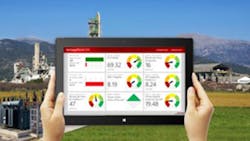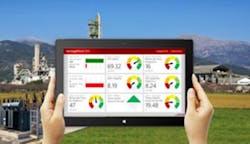Rockwell Automation takes seriously the needs of its users to access information when on the go. For years now, they've offered the ability to send text or email notifications to mobile devices or replicate in-plant or desktop user interfaces on portable screens.
But the true power of today's mobile technology lies not in its ability to provide simple information access on a tablet or smartphone, said Kyle Reissner, Rockwell Automation product manager and mobility platform leader, in his presentation to RSTechED attendees this week in Orlando, Florida. "Mobility isn't just a consumption-of-data tool," Reissner said. "It's an enabler of new possibilities."
Reissner pointed to the iPhone as an example of a mobile technology that really didn't take off until Apple realized and played up its ability to do new things in new ways. The vision of the first iPhones was for users to interact with the outside world through a Web browser, Reissner explained. "But once it was optimized for apps, it was no longer a device that did something better. Instead, it transformed how we interact with our devices."
Don't Just 'Give Me My Screens'
Such is the productivity revolution promised by mobility in manufacturing today. People focus too much today on security, on IT compliance, on other roadblocks to mobile technology, Reissner believes. "Once you find the new applications that increase productivity not by 1 or 2 but by 10 percent, these other issues will take care of themselves," he said. "If you show you can grow productivity, you'll find a way to provide secure network access."
Mobility isn't just a consumption-of-data tool. It's an enabler of new possibilities.—Kyle Reissner, Rockwell Automation product manager and mobility platform leader
To further illustrate the transformative potential of mobile technology, Reissner described three personas--each of whom was enabled by the platform's native capabilities. Joe, a maintenance supervisor, created an end-of-day production report mash-up on his tablet. He tweaked it up on the fly to exclude a few invalid data points then shared it with his boss. Later, that same report was available for further sharing or manipulation on his desktop portal.
Nate, a young engineer out on his lunch break, received a smartphone alert based on his responsibilities at the plant. He suspected he knew the cause and used his smartphone to attach a voice memo to the alert describing what would happen next if he was right and forwarded it to the plant operator. When the operator confirmed Nate's prediction, he created a new business rule on the fly (again on his smartphone) that would directly inform the operator what to do if this combination of conditions happened again.
Scarlett, a manager at her desk, received a high-priority quality alert via email. She connected directly to the in-plant HMI and was able to analyze the situation through a portal view of operational data, displayed in terms with meaning to her. She remembered hearing of a similar situation at another plant, video-conferenced in the other plant's remote expert and local operator, who together solved the problem. The operator, in turn, shared the incident and proper corrective action with other shift operators.
In each case, these individuals didn't start with a stack of system user manuals and documentation, Reissner stressed. These mobile tools are "something you can give to anyone," he said.
The first outward expression of the new perspective on mobility from Rockwell Automation is reflected in the company's FactoryTalk VantagePoint EMI (for Enterprise Manufacturing Intelligence) which was released earlier this year. "VantagePoint EMI started us down this path of a native mobile environment," Reissner said. "It was our first step in enabling users differently."
Next up is FactoryTalk VantagePoint Mobile, which will be built into version 6.0 of the software due out in August 2014. "We start with the smallest piece of glass and work backwards to the desktop," Reissner said of the development of the consistent, "mobile first" user experience that its customers can expect from the tool.
"We view mobile as going beyond replacing existing experience," Reissner reiterated. "We want you to take our products where they've never been, to solve problems you couldn't before."

